Croatian Tech Company Gideon Presents Casey the Robot
May the 31st, 2022 - The Croatian tech company Gideon has presented its brand new innovation which will only contribute even further to placing Croatia on the tech map - Casey the robot.
As the trend of e-commerce continues to grow exponentially, with the global coronavirus pandemic which emerged back at the beginning of 2020, robotics is a field becoming not only more popular, but necessary in the face of increased demand.
As Poslovni Dnevnik/Darko Bicak writes, the wildly successful and already very well known Croatian tech company Gideon, which has offices in Germany and across the pond in the USA, recently presented its new solution for automation and the optimisation of order preparation in distribution centres.
The company, which has alredy attracted the eyes and ears of the demanding technology works, deals with robotics and solutions based on artificial intelligence (AI).
Casey the robot is a solution developed for the preparation of orders for goods packed in boxes and works to improve the commissioning process through the optimisation and harmonisation of the tasks of both humans and robots with a payload of up to 1000 kg.
As they pointed out from the Croatian tech company Gideon, this brand new solution helps companies alleviate labour shortages and the challenges posed by strong e-commerce growth.
“The rise of e-commerce is a clear indication that the use of new automation technologies is the key to sustainable growth. Namely, e-commerce creates additional pressures on business because it is more labour-intensive and intensifies changes in customer expectations, for example, when it comes to delivery deadlines. Analysts' latest forecasts point to strong growth in e-commerce globally - by as much as 50 percent to 7.4 trillion US dollars by the year 2025,'' the technology company said.
Josip Cesic, Chief Technology Officer and co-founder of the Croatian tech company Gideon, pointed out that Casey eliminates the cost of damage to both products and equipment and reduces staff costs by up to 40 percent.
For more on Croatian companies, entrepreneurs, ideas and inventions, make sure to check out Made in Croatia.
Greenpeace Adriatic Protest Held in Front of Tanker Headed for Omisalj
May the 31st, 2022 - A Greenpeace Adriatic protest was held in front of a large tanker (SCF Samotlor) headed for the Port of Omisalj, which was transporting Russian oil.
As Morski writes, Greenpeace activists protested recently in front of the SCF Samotlor tanker, which was transporting Russian oil to the Port of Omisalj. They staged a protest ahead of a recently held European Union (EU) summit, urging EU political leaders to urgently impose an embargo on all Russian fossil fuels and speed up the energy transition to renewable energy and energy efficiency.
Greenpeace pointed out that since the beginning of the war in Ukraine back in February, EU countries have spent more than 54 billion euros on Russian oil, gas and coal, which turns out to be co-financing the war still going on in ravaged Ukraine.
Hundreds of millions of euros continue to flow from EU countries into the Kremlin in exchange for Russian fossil fuels, and EU leaders have still failed to impose sanctions that would effectively curb this, what they deem to be an utterly immoral trade. In other words, and in the opinion of those who held the recent Greenpeace Adriatic protect, the European Union is still co-financing the war in Ukraine and such a practice must stop immediately.
''The EU must finally show true solidarity and impose an embargo on all Russian fossil fuels. No delays, no legal loopholes, no special treatment and exemption for any country,'' warned Eszter Matyas, campaign manager at Greenpeace CEE.
The Greenpeace Adriatic protest took place the day before the aforementioned summit, and the European Commission has proposed phasing out Russian oil imports in most EU member states, but not before the end of this year. Some countries like Hungary, Slovakia and Bulgaria could get even more time permitted. Recent comments from European Commission President Ursula von der Leyen show that EU leaders are nowhere near an agreement, Greenpeace warned.
''The humanitarian catastrophe in Ukraine will only continue to deepen if a weak embargo is imposed, or if nothing is imposed at all. The war in Ukraine should be a wake-up call for European Union leaders. Security in a world powered by fossil fuels simply doesn't exist. The current ban on all Russian fossil fuels can and must be a strong impetus for the development of renewables and energy efficiency across Europe. It's important not only because of climate security, but also because of its independence from autocratic regimes that trade in fossil fuels,'' said Petra Andric from Greenpeace Croatia.
The majority of oil consumption in the EU is accounted for by transport, while the EU is dependent on imports for as much as 97% of its oil products. A study commissioned by Belgium's Greenpeace offers guidance to those responsible for decarbonising Europe's transport sector by 2040, which could be powered by renewable energy without relying on biofuels. The International Energy Agency (IEA) recently announced that a limited set of short-term transport measures could reduce consumption by as much as 2.7 million barrels of oil per day over the next four months. In Germany, short-term measures could reduce Russian oil imports by about a third, the global organization warns.
When it comes to the Greenpeace Adriatic protest, activists have also held similar protests in Ukraine since the start of the war, calling for an embargo on Russian fossil fuel imports to European countries including Germany, France, Italy, Poland, Greece, Hungary, Denmark, Norway, the United Kingdom and Croatia in late March.
For more, check out our lifestyle section.
Direct Budapest-Split Train to Run From 10 June, 2022
May the 31st, 2022 - A direct Budapest-Split train is set to run as of the 10th of June, 2022, and affordable prices will certainly encourage Hungarian citizens to travel the Croatia's second largest city.
As Morski writes, Hungarians will once again be able to hop on the direct Budapest-Split this summer. As of June the 10th, the Adria InterCity night line will be introduced, which will connect these two European cities three times a week during the very height of the summer season, while it will run twice a week before and after the season, Hungarian Railways announced.
The direct Budapest-Split train will run from the City of Budapest on Tuesdays and Fridays from the 10th to the 19th of June and from the 29th to the 24th of August, and from the City of Split on Wednesdays and Saturdays. During the high season, from June the 19th to August the 29th, it will depart from Budapest on Tuesdays, Fridays and Sundays, and from Split on Mondays, Wednesdays and Saturdays.
The trip will last for fourteen hours and will mostly be done at night. Passengers will be offered the ability to sleep the night in air-conditioned cars, and according to Hungarian Railways, the train will depart from Budapest at 18:45. They will depart from Split at 18:27, and arrive back in Budapest the next day at 09:35.
The direct Budapest-Split train line, they say, is tailored to all requirements. The sleeping car has cabins with four or six beds, while solo passengers, couples and smaller families can spend the night in smaller cabins with one to three beds.
This train is also equipped with a restaurant wagon, which will be open throughout the entire duration of the trip, and all passengers will receive a welcome package upon boarding, while a hot drink and breakfast are all included in the initial ticket price.
Passengers will be taken care of during the trip by the train's staff, who, they say, will offer additional food and drinks at reasonable prices. The price of the trip for an adult starts from 43 euros, and for children aged 6-14 from 15 euros. For a night in a double cabin you need to pay 69 euros per person and per direction, while solo travellers can have their own cabin for 99 euros.
For more, make sure to check out our dedicated travel section.
Heart of Velebit Bicycle Race Becomes Bike Standard
May the 31st, 2022 - Thanks to social media, the Heart of Velebit bicycle race has become a bike standard, shining a light for all lovers of hiking and cycling in Lovinac and gorgeous, mountainous Lika.
As Novi list/Marin Smolcic writes, Croatia continually attracts lovers of active tourism, from hiking to cycling and everything in between. While the sweltering heat of the height of the summer season commands little else but lying around and moving only to swim in the Adriatic, the pre and post season are excellent times to engage in some more active choices when spending time in any part of this geographically blessed country.
As such, over this long weekend in the wider area of Lovinac and South Velebit, the traditional Heart of Velebit bicycle race was held. The wider Lovinac Municipality has, as a result, become among the first choices of destination for lovers of mountain biking and the magnificent beauty of Velebit and the Lovinac area.
Every day from the early morning, groups of cyclists have continued to pass at speed through the Lovinac area, who, with the watchful eye of the volunteer guides of the Heart of Velebit hunting association, enjoyed bicycling and cycling-mountaineering trails of various technical and fitness requirements.
The Heart of Velebit cycling race started on May the 27th, 2022, with the bike & hike tour of Sveto Brdo. More than 40 of the most experienced and prepared cyclists embarked on a multi-hour adventure which took them through wild and beautiful mountainous landscapes, all of which was documented on social media, attracting more would-be cyclists.
The popularity of this race has been spreading rapidly because the photos shared by the participants are the best indicator of their enthusiasm and guarantee the arrival of new lovers of cycling and hiking in Lovinac and Lika.
Cycling tourism in Croatia is otherwise certainly growing, with many locations along the mainland and on the islands promoting cycling as being among the best ways to see the glorious Croatian landscape, be it coastal or continental.
For more, check out our lifestyle section.
KK Zadar Wins Final Series Opener at Cibona Zagreb 70:77 (43:42)
May 30, 2022 - Defending champions KK Zadar have started this year's best of five finals series with an away victory in front of 2000 spectators at the Basketball Center "Dražen Petrović" in Zagreb and have taken over the role of favorites.
Cibona had gone into the game rested after defeating Gorica 2:0 in the semi-finals last Monday, while Zadar had to go all the way to beat KK Split in the third game Friday night.
The first half was a close game between the routine team of Zadar and the young team of Cibona containing plenty of talent. Okorn Gašper's home team went into half-time with a slight lead (43:42).
During the third quarter guest coach Srđan Helbich's team was able to increase the intensity and take the first decisive lead (53:58).
Cibona was able to come back and tie the game at 64:64 with just under 4 minutes to play, but a 10:0 run with points by Drežnjak and Thompson decided the game at 64:74 and 95 seconds on the clock.
Zagreb's Branković was the game's top scorer with 16 points, Thompson 15, Carter 13, and Drežnjak 12 had double digits for Zadar.
On Wednesday Cibona will now need to win the second home game in order to maintain a proper shot at the title before Zadar will have two home games to possibly finish the series early.
Points by quarter: 20:24, 23:18, 10:16, 17:19
Referees: Kardum Luka, Hadžić Denis, Jurčević Josip
Box score: https://fibalivestats.dcd.shared.geniussports.com/u/HKS/2097374/bs.html
For more, make sure to check out our dedicated sports section.
Exports in 2021 Up 29%, Imports by 24%
ZAGREB, 30 May 2022 - Croatia's commodity export in 2021 totalled HRK 144.3 billion, up by HRK 32 billion or 29% on the year, while import was valued at HRK 214 billion, up by 42 billion of 24%, the Croatian Bureau of Statistics (DZS) reported on Monday.
The foreign trade deficit was around HRK 70 billion, increasing by about HRK 9 billion (+16%) from 2020.
The export-import ratio was 67.5% in 2021, whereas in 2020 it was 65%.
With a share of 81% in the total export in 2021, the manufacturing industry generated an increase in exports of about 21%, to HRK 116.3 billion thus contributing the most to overall export trends.
The manufacturing industry contributed the most also to import growth in 2021, accounting for 87% of all imports and an increase in imports of 19% from 2020, to HRK 186.4 billion.
Croatia's most important foreign trade partners in 2021 were EU member states, for 70% of the total exports and about 77% of the total imports.
In 2021, commodity exports to the EU totalled HRK 100 billion, up 31.3% on the year, while imports increased by 20.1% to HRK 163.9 billion.
The biggest foreign trade partners from the EU in 2021 were Germany, Italy and Slovenia.
Trade of goods with non-EU member states accounted for about 30% of the total export in 2021, an increase of about 23%, and for about 23% of the total import, which increased by about 39% compared to 2020.
The biggest foreign trade partners outside the EU in 2021 were Bosnia and Herzegovina, the United States and Serbia.
For more, check out our business section.
Luka Plantić Wins Bronze at Men's European Boxing Championships
ZAGREB, 30 May 2022 - Croatian boxer Luka Plantić, a member of the Salona Boxing Club, ended up winning the bronze medal at the European Boxing Championships in Yerevan, Armenia after losing in the semi-final match.
The 25-year-old Plantić lost the semi-final match to Russian athlete Artem Ageev who competed for Serbia. Ageev is one of seven Russians wearing Serbia's colours at the championships in Yerevan. He won the first medal for Serbia's boxing team back in 1991.
The bronze medal is Plantić's best career success after winning the junior European championships and second place in the junior world championships.
A total of 219 boxers from 39 countries competed in Yerevan and medals were won by boxers from 20 countries.
Croatia had five competitors at the championships - Luka Plantić, Petar Cetinić, Matteo Komadina, Marko Zeljko and Damir Plantić.
To read more about sport in Croatia, follow TCN’s dedicated page.
8 Magical Towns in Central Istria that Are Absolutely Worth Visiting
May 30, 2022 - Istria is one of the most fascinating regions of Croatia, and while most are more familiar with its magical seaside towns like Pula, Rovinj, Umag, or Poreč, the many medieval towns in Central Istria are just as impressive and definitely worth being explored.
In recent years, Istria has shown its might as a tourist destination, defying the surreal circumstances caused by the coronavirus pandemic by being easily reached by land from other European countries. But Istria is not at all a consolation prize for its proximity, quite the opposite. The largest peninsula in the Adriatic is home to spectacular towns, world-renowned wines and olive oils, unique cuisine, numerous beaches, five-star hotels, and a wealth of culture and history.
But not everyone comes up with an idea of this region beyond the sea, the islands, and the beaches, something that happens similarly in Dalmatia. Some forget that much of Istria's magic lies (not so) far from the coast. With this in mind, here we show you some of the best destinations you can visit in Central Istria. Warning: Not to be confused with Central Istria as a public administration, since it only covers some districts. In this article, we will mention destinations on the Istrian peninsula that are not located by the sea.
Pazin
Located right in the heart of Istria, Pazin is known for medieval Pazin Castle, the former residence of the Istrian margraves. The intensity of life here is pretty much the same in winter and summer, with the monthly exception of every first Tuesday, when a flood of curious buyers from all over Istria runs into the town to visit the traditional Pazin Market. Pazin is very rich in culture and history due to the presence of different civilizations, empires, and governments throughout time. Be sure to visit the Pazin castle, the Pazin abyss, the Franciscan monastery, the Memorial Center of Union and Freedom, the state archives, and more. Learn more about Pazin here.
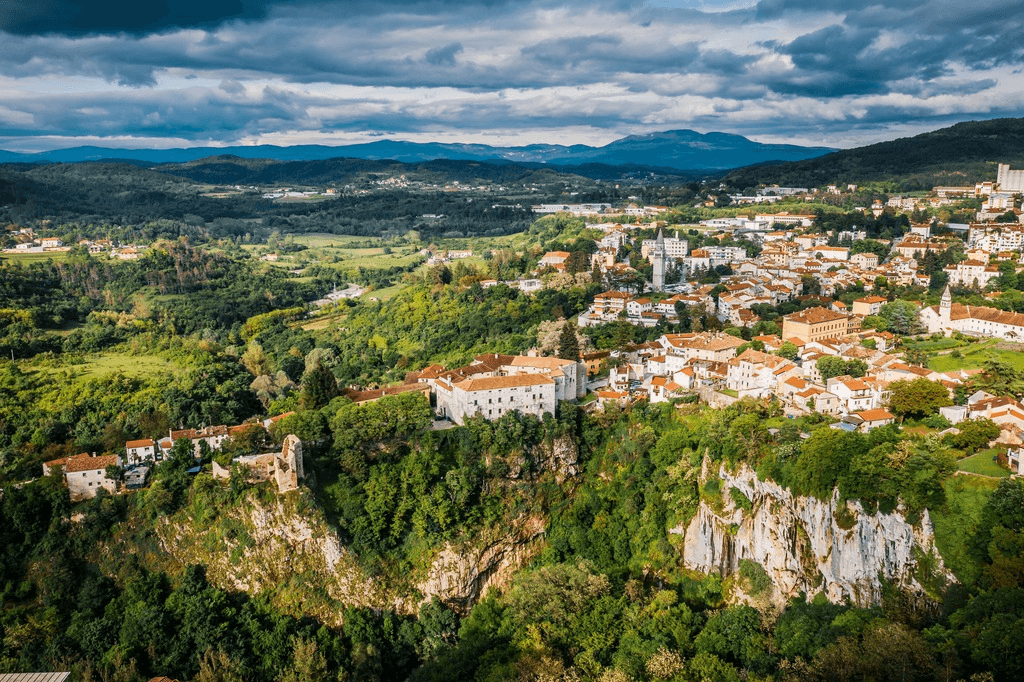
Image: Tourist Board of Central Istria/Official Website
Motovun
Motovun sits on top of a hill towering over the valley of Mirna, the biggest Istrian river. The location was settled since Celtic times, but the town we know today was mostly built under Venetian rule in the Middle Ages. Its centuries-old walls and buildings are the best preserved in Istria, giving the place a unique charm. Yet Motovun is more than its quaint architecture and breathtaking view. It is the Croatian capital of truffles and hosts a famous film festival, which will take place from July 26 to 30 this year. Learn more about Motovun here.
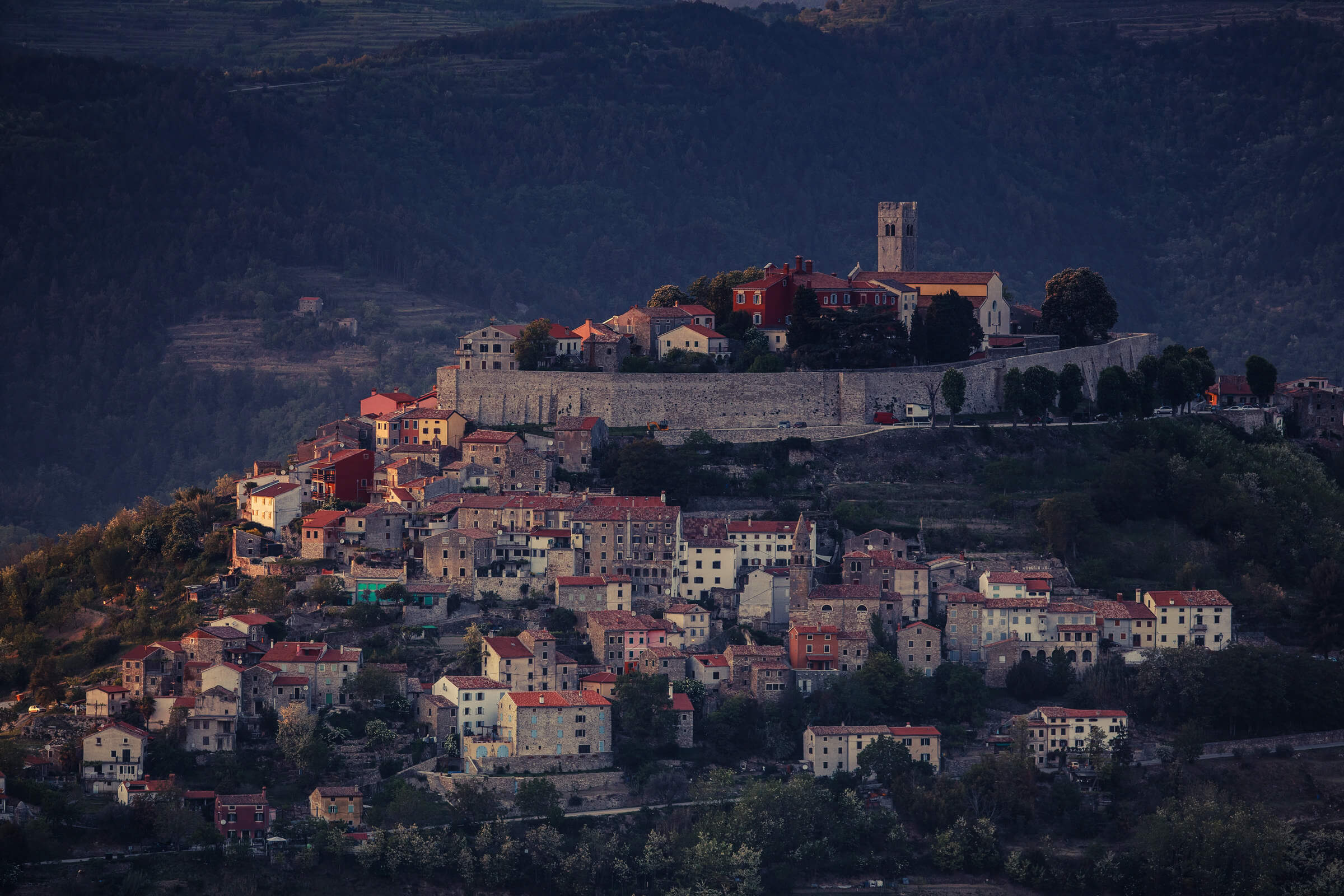
Photo: Mario Romulić
Hum
Often referred to as the smallest town in the world, Hum is a town situated on a hilltop above the source of the Mirna River. It is located in the vicinity of Buzet and Roč. The towns of Roč and Hum have been connected through a shared history and culture since ancient times, and are now also connected by the famous Glagolitic Alley. Hum has just 20 inhabitants, and therefore its well-known name as the smallest town in the world. Learn more from Hum here.
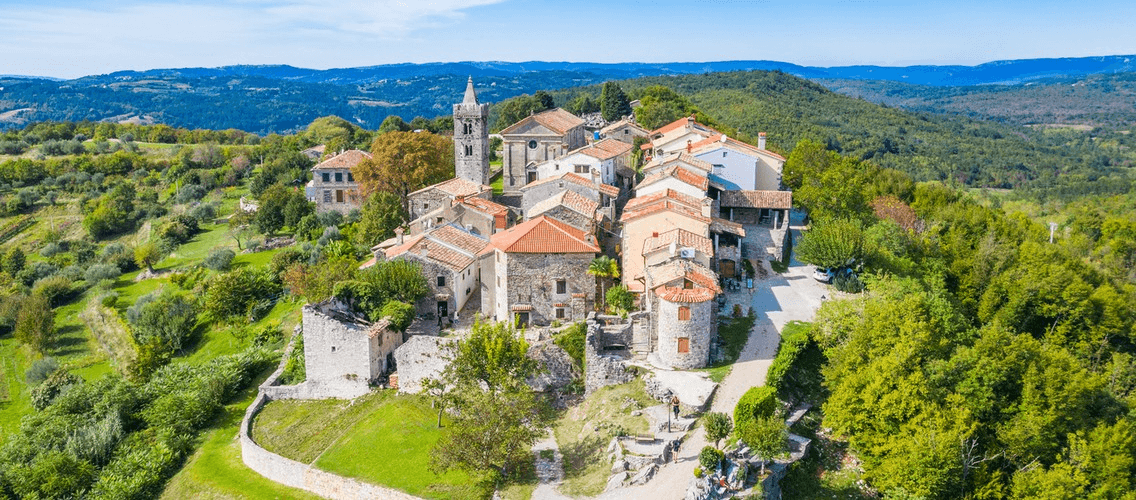
Image: www.valamar-experience.com
Labin
Labin is the biggest town in the otherwise not-so-populated and not-so-popular eastern Istria. In the past, the town was known for its coal mines. Nowadays, all the mines have been closed, and there are no more miners. The community is turning more and more towards tourism - but is far from being overwhelmed by it. Its old town, sitting on top of a hill, is among the most beautiful ones on the peninsula. Although it's not located by the sea, and exactly because of that, Labin has a stunning view of Kvarner bay. Learn more about Labin here.
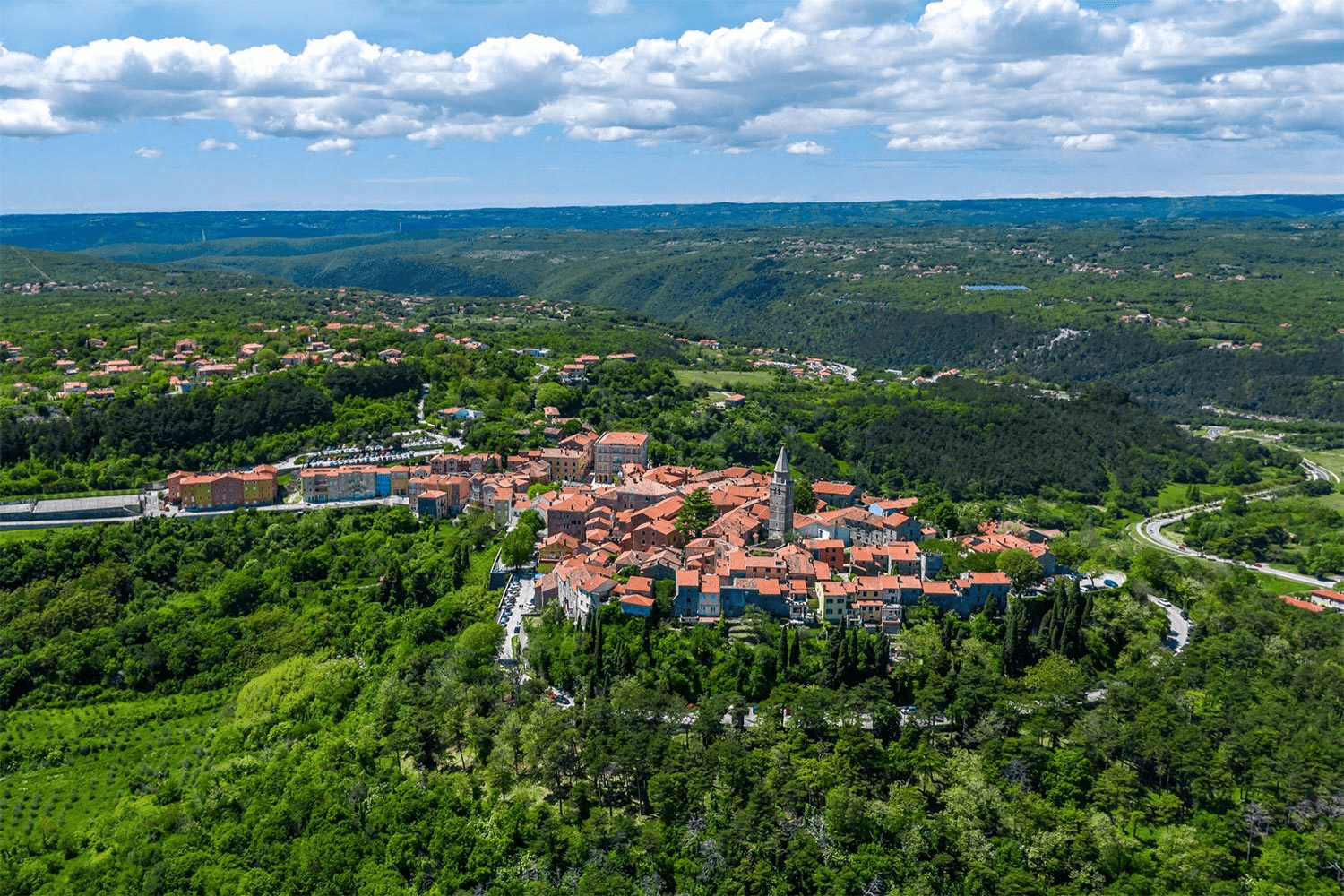
Image: Labin-Rabac Tourist Board/Official website
Vodnjan
Vodnjan is situated near Pula, where excellent olive oil is produced, and its surroundings have the largest number of kažun houses, dry-stone houses in the Mediterranean. The largest church in Istria –Parish Church of St Blase was built at the end of the 18th century, with the 63-meter-high bell tower. The church holds a valuable collection of sacral art and preserved bodies of saints, the so-called Vodnjan mummies, due to which it is visited by around 16000 people a year. Learn more from Vodnjan here.
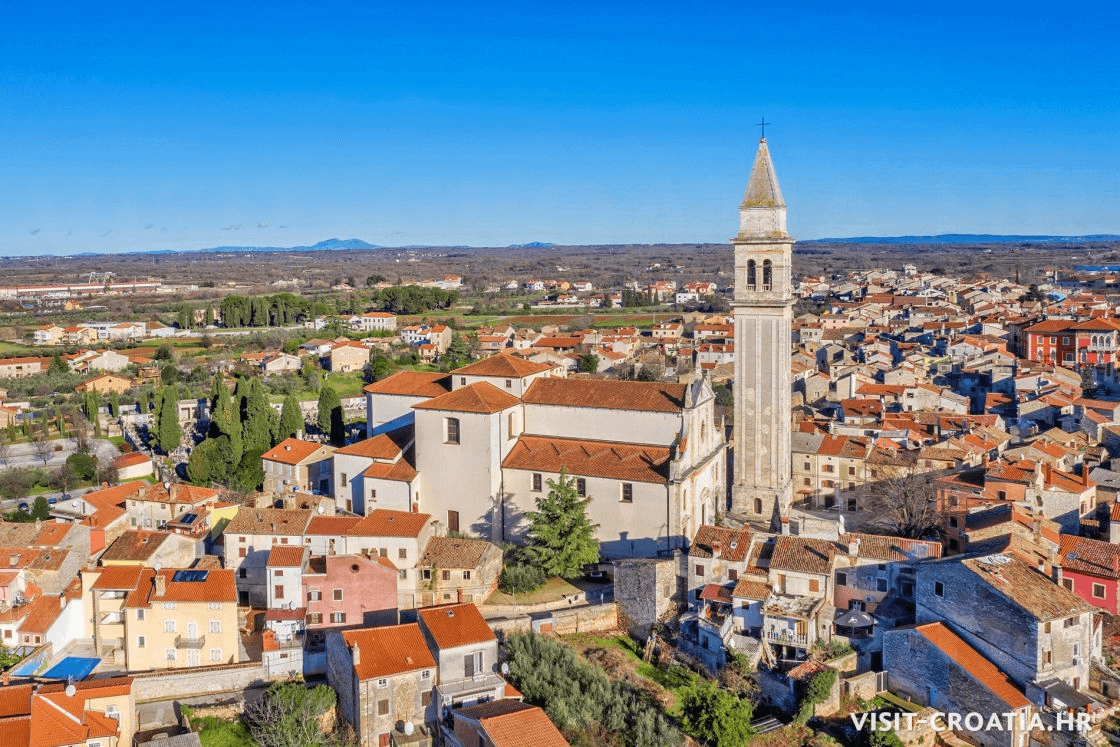
Image: www.visit-croatia.hr
Buje
The area of the town of Buje is located in the northwestern part of the Istrian peninsula. Approximately 5,300 inhabitants live in an area of 103.40 km2. The town of Buje is located between the rivers Mirna and Dragonja. In the north, there are the hills of the Upper Buje, and in the south the Adriatic Sea in Kanegra and the Piran Bay. It is a rolling and hilly area covered with vineyards, olive groves, and arable land dotted with oak, cherry, and pine forests, a karst belt full of interesting geological phenomena, and meadows of Mediterranean vegetation, among which thyme and spruce predominate. Learn more about Buje here.
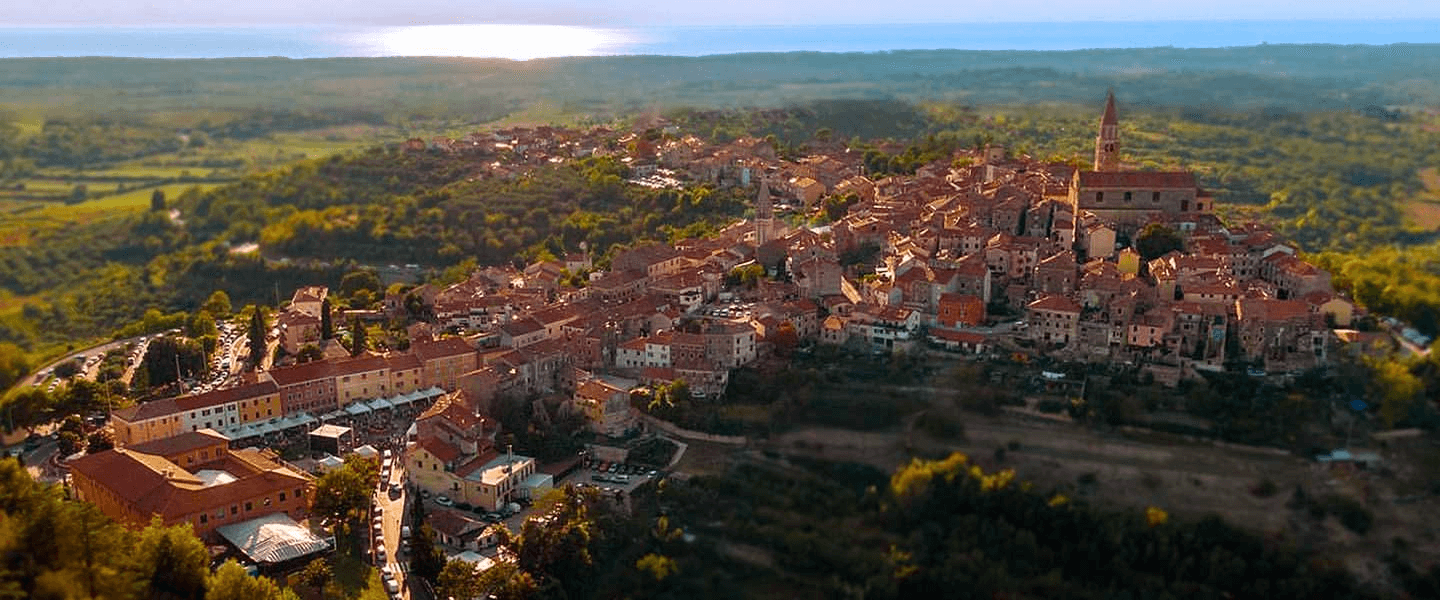
Grožnjan
The nearby Motovun might be the quintessential Istrian hilltop town, but Grožnjan is also well worth visiting. As is the case with many Istrian towns, it was settled during the Roman times, built under Venetian rule in Middle Ages, and well preserved up to today. The place was almost deserted after World War II, but in 1965 a group of artists decided to turn the town into an art colony, which remains up to the present. It’s a great accommodation spot for those who don’t need the sea, and it makes for a good base for exploring the hilly part of Istria. Learn more about Grožnjan here.
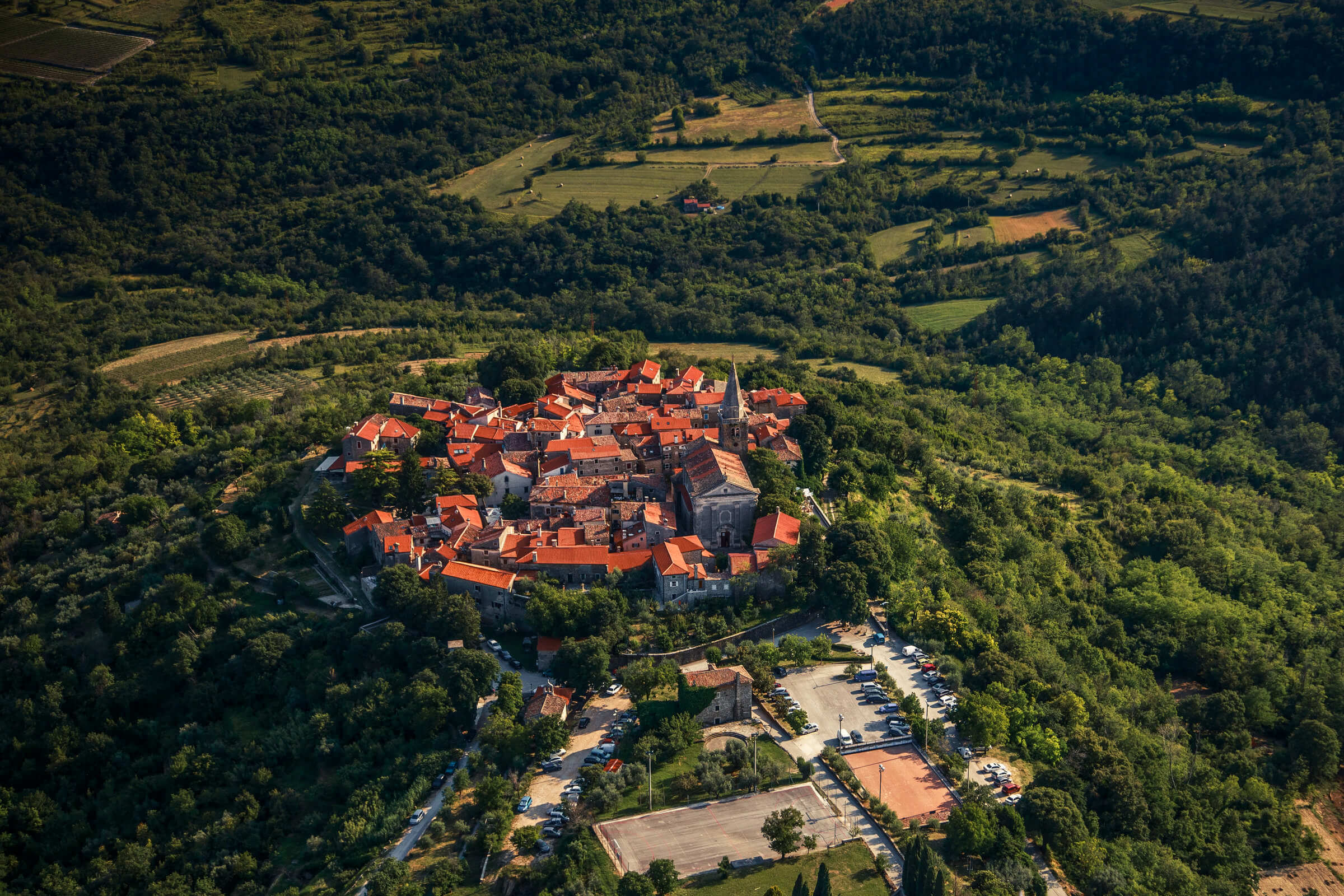
Photo: Mario Romulić
Pićan
Sometimes it is not easy to follow the traces of Pićan in historical sources because it hides under various names. The origin of the name Petina is attributed by some to the assumption that the Diocese of Pićan was the fifth in the world, with the word five (pet, in Croatian) having Celtic roots. Pićan is certainly inhabited in distant prehistory. The oldest parts of the Istrian hillfort were located on the hill of Calvary, north of today's settlement, and then it is assumed that the Celtic tribe Secusa lived there. In Roman times, probably in the same strategically well-chosen place, there was a military stronghold and the settlement of Petina. Learn more about Pićan here.
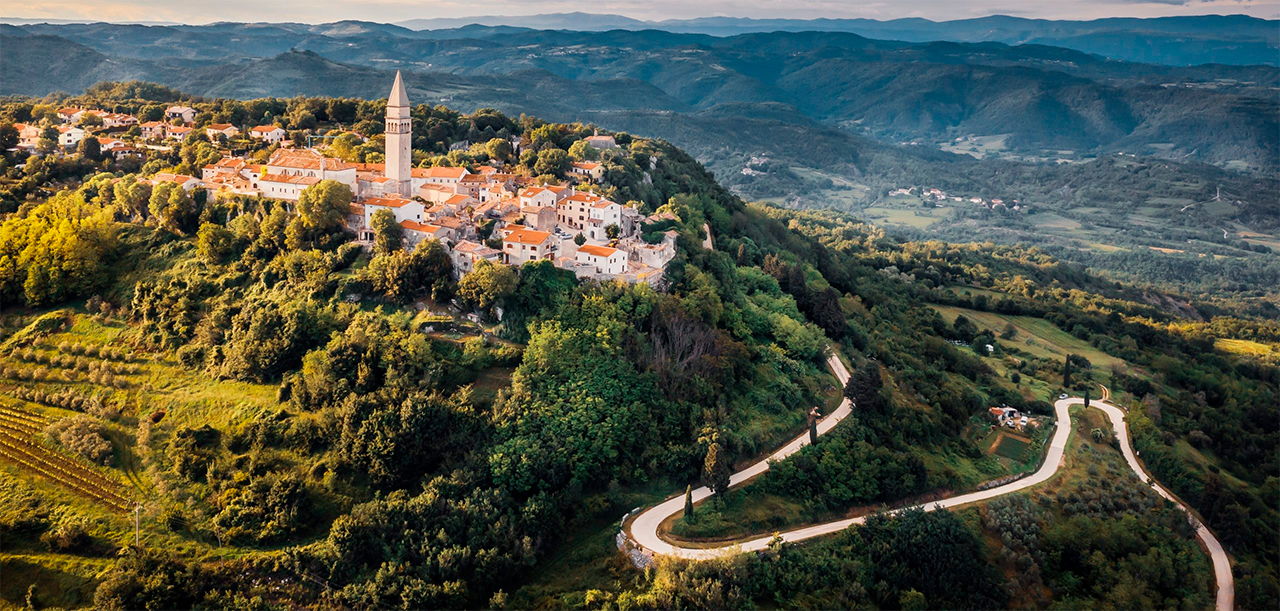
Image: Pićan municipality/Official website
For more on travel in Croatia, follow TCN's dedicated page.
Plenković: Investment Decision on Expansion of LNG Terminal Very Close
ZAGREB, 30 May 2022 - Croatia will most likely decide to expand the existing floating LNG terminal on Krk Island and an investment decision is very close, Prime Minister Andrej Plenković said in Brussels on Monday.
"Various options exist and the best and most effective one is an investment in the existing terminal to increase its capacity," Plenković said ahead of an EU summit where the main topic will be Ukraine and the consequences of the Russian aggression, which is why the EU is endeavoring to reduce its dependence on Russian energy and diversify its supply routes as soon as possible.
"In the current circumstances, despite it being a surprise to many, Croatia has the opportunity to become a real energy hub for Central Europe," Plenković underscored.
He added that an investment decision is very close regarding the expansion of the existing terminal so that it can be used by many countries in the neighborhood, Slovenia, Hungary, Bosnia and Herzegovina, and others.
Plenković did not wish to comment on Hungarian Prime Minister Viktor Orban's statement that excluding the Druzhba oil pipeline from a ban on Russian oil imports was a good approach but that Hungary needs a guarantee that it can import oil also in case of any incident occurring on the section of the pipeline that runs through Ukraine.
"I didn't hear what he said so I cannot comment but I can say that (Croatian oil pipeline operator) Janaf, which transports oil from Omišalj towards the mainland, including Hungary, is completely capable of supplying huge quantities of oil that are required by Hungarian refineries," said Plenković.
With regard to procuring vacuum gas oil that INA obtains from Russia for its refinery in Rijeka, Plenković said that "INA is not the only one in the world that needs vacuum gas oil, other refineries need it too and supply it from other countries."
According to a European Commission recommendation, Croatia could continue to obtain vacuum gas oil from Russia for the Rijeka refinery on the condition it does not have an alternative from other sources.
Plenković said that EU leaders will just "touch on" the subject of a sixth package of sanctions at the summit. EU leaders have not been able to come to an agreement on the matter for a month now because of Hungary's opposition and Plenković said the matter would be decided at the level of ambassadors and ministers.
The basis for discussion on the energy issue will be the European Commission's RePowerEU program, which says that the EU should invest in a joint effort to secure sufficient energy products and create an alternative network for its citizens and economies so as to be able to stop being dependent on Russian energy.
"Some countries' dependence on Russia has developed for years and that cannot be changed overnight," said Plenković.
For more, check out our politics section.
Fajon: Slovenia Supports Croatia's Entry to Schengen Area
ZAGREB, 30 May 2022 - Slovenia supports Croatia's entry to the Schengen Area, Slovenia's future foreign minister Tanja Fajon said on Monday but warned that a consensus o the matter would be hard to achieve in the European Union before the Schengen policy was reformed.
Slovenia supports the expansion of the Schengen Area to Croatia, Romania, and Bulgaria but it will be difficult to achieve political agreement on that, Fajon said answering questions from the parliament's foreign affairs committee.
She added that the reason for this was "mistrust" between members of the Schengen Area that emerged after the migration crisis of 2015 and 2016, which was why five Schengen Area member states, including Austria, were still conducting tighter controls on the border with neighboring countries that were not in the Schengen Area.
"Until such time that we reform the Schengen treaty, I think enlargement to the three new countries is jeopardized. I think that we first need to create powerful trust between the member states," Fajon said.
In her introductory address, in which she presented the principles based on which she will conduct Slovenia's foreign policy, Fajon said that she will advocate consistent respect for the border arbitration agreement with Croatia, as stated in the coalition agreement between the three parties that will form the new Slovenian government, headed by Robert Golob.
However, she added that she sincerely advocates the strategy of the best possible relations with Croatia, noting that Croatia's entry into the Schengen Area and the OECD is in the mutual interest of Slovenia and Croatia.
"We have a lot more common interests than differences with Croatia, and all issues can be resolved if there is political will," said Fajon.
Fajon said that Slovenia will advocate for EU enlargement to Western Balkan countries and for dialogue between Belgrade and Priština and that it will participate more actively in that process both at the European level and at the forums of regional initiatives.
She criticized the outgoing government led by Janez Janša in reference to foreign policy over the past two years, notably its "deficient" respect for independent institutions and the media, as well as its closeness to "the authoritarian regimes" in Hungary and Poland.
Fajon added that Slovenia would once again turn to the "core" EU countries with strong institutions and respect for the rule of law. In that context, she singled out Germany, but she also mentioned France and Italy.
For more, check out our politics section.


